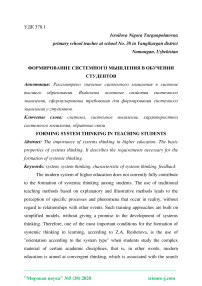Forming system thinking in teaching students
Автор: Isroilova Nigora Turgunpolatovna
Журнал: Мировая наука @science-j
Рубрика: Основной раздел
Статья в выпуске: 5 (38), 2020 года.
Бесплатный доступ
The importance of systems thinking in higher education. The basic properties of systems thinking. It describes the requirements necessary for the formation of systemic thinking.
System, system thinking, characteristic of systems thinking, feedback
Короткий адрес: https://sciup.org/140293935
IDR: 140293935 | УДК: 378.1
Текст научной статьи Forming system thinking in teaching students
The modern system of higher education does not currently fully contribute to the formation of systemic thinking among students. The use of traditional teaching methods based on explanatory and illustrative methods leads to the perception of specific processes and phenomena that occur in reality, without regard to relationships with other events. Such training approaches are built on simplified models, without giving a promise to the development of systems thinking. Therefore, one of the most important conditions for the formation of systemic thinking in learning, according to Z.A. Reshetova, is the use of "orientation according to the system type" when students study the complex material of certain academic disciplines, that is, in other words, modern education is aimed at convergent thinking, which is associated with the search for the only right solution. And we must try to orient students towards divergent thinking, which is aimed at finding the optimal solution based on many options. Such thinking develops the ability to see the problem more fully, which will contribute to the development of systemic thinking among students.
Thus, learning the basics of systemic thinking should begin with dividing any system object into its component parts (subsystems), finding their main characteristics, establishing the relationships between them, determining their possible combinatorial combinations. But even such a view leads to a simplified perception of reality. A system is an entity that exists and functions due to the multivariate interaction of its many elements. It largely depends not on what these elements consist of, but on how they interact with each other. Such interactions are not always linear, they are often hidden and unobvious, can even be paradoxical. The task of systemic thinking is to draw up such a model of the processes or phenomena under consideration that will allow us to most accurately set reference points in it.
Of course, it’s good when the foundations of systemic logical thinking are laid in childhood, but the school system does not contribute to such training in the proper amount, but only gives the "beginnings" to such training. Therefore, from the first year, students in higher education should be guided by systems thinking in close interconnection between the studied disciplines.
Reshetova, arguing that systemic thinking "opens the way for the student to a new understanding of the world - representing the systemic image of the world and himself in it". Therefore, systemic thinking has a number of characteristics: - taking into account relationships and relationships in the field of interaction; - understanding the possibility of the emergence of qualities that cannot be reduced to the properties of components (emergence); - understanding the need for distortion of the reality model to simplify perception, the ability to switch from one model to another; - the ability to see feedback (i.e., when one of the links in the system is affected, changes occur, the results of which can always be seen, but often these results can be quite delayed in time, which makes their diagnosis difficult); - the ability to see reality at different levels, under varying degrees of increase, the ability to switch from one coordinate system to another, the ability to pay attention to both the whole system and its parts; - the independence of creating our own mental models of the world, with the help of which we create our own causal relationships.
In order to understand how the process of forming systemic thinking occurs, you need to know the level of human cognition of the world, i.e. how deep is his “life knowledge” - acquired life experience. Often we see only what we want, without paying due attention to the reality surrounding us. Therefore, it is necessary to teach students to pay attention to the nuances that allow you to change the existing "picture of life" and contribute to systemic thinking. To do this, it is necessary: - to teach students to pay attention to particulars that help expand the system of views, as a result of which to find new connections or factors of influence; - teach mental modeling, i.e. mentally complete what is not enough to build a complete system-logical chain, based on known facts; - Teach to cite several possible options and choose from them the most rational; -generalization of scientific knowledge to form their own opinions. Therefore, the teacher in the development of educational and methodological complexes should not only carefully develop the material of the current disciplines, but also point to existing connections with previously studied material to form a more complete picture of the worldview. To do this, it is necessary to teach students to destroy existing stereotypes that they developed on the basis of previously acquired life experience; feedback between teachers and students needs to be strengthened; help broaden the interests of students; in practical exercises, simulate situations of uncertainty and solve creative problems with them.
Список литературы Forming system thinking in teaching students
- Reshetnikova Z.A. The psychological theory of activity and the activity-based approach to learning [Text] / Z.A. Reshetova // Psychological theory of activity: yesterday, today, tomorrow / Ed. A.A. Leontiev. - M .: Sense, 2006 .-- S. 242-250.
- Sychev, I.A. Formation of systemic thinking in learning by means of information and communication technologies: monograph / I.A. Sychev, O.A. Sychev – Biysk: AGAO them. V.M. Shukshina, 2011 .-- 163 p.
- Mamontova, S.V. modern guidelines for innovation in the educational process: // Innovative technologies in the educational process XIII International Scientific and Methodological Conference: dedicated to the 250th anniversary of VEO of Russia. 2016.S. 145-151.


